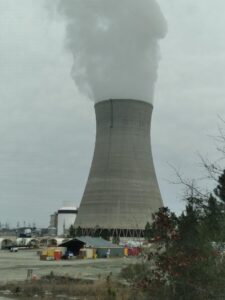
Photo: Unit 3 at Georgia Power’s Plant Vogtle, Georgia, started operation in August 2023; cover photo: units 3 and 4 (unit 4 is due to start operation in the 2nd quarter 2024, barring more of the usual delays)
Thanks to our colleague Dr. Ed Lyman for sounding the alarm about efforts to further weaken the regulatory abilities of the U.S. Nuclear Regulatory Commission.
Conflicts of interest surrounding nuclear laws could undermine US safety
The House of Representatives is expected to vote soon on nuclear regulatory legislation that once again would put the proverbial fox in charge of the henhouse.
Nearly 50 years ago, Congress passed the Energy Reorganization Act and took an axe to the Atomic Energy Commission, the secretive federal agency created after the World War II-era Manhattan Project to develop and control military and civilian nuclear technology. The AEC was formerly led by Lewis Strauss, the antagonist to J. Robert Oppenheimer recently portrayed on-screen by Robert Downey, Jr.
This move was partly a reaction to growing concerns about the conflict of interest arising from the AEC’s dual missions to promote and regulate nuclear energy.
As Sen. Abraham Ribicoff (D-Conn.), a primary sponsor of the legislation, stated at the time, “The development of the nuclear power industry has been managed by the same agency responsible for regulating it … it is clearly not in the public interest to continue this special relationship.”
The act split the AEC into the Nuclear Regulatory Commission, which is charged with overseeing the safety and security of civilian nuclear power, and the predecessor of today’s Department of Energy, which assumed the AEC’s nuclear development and promotional functions and has been vigorously carrying them out in recent years.
The NRC’s sole responsibility, according to its mission statement, is to license and regulate the civilian use of radioactive materials to provide “reasonable assurance of adequate protection of public health and safety,” “promote the common defense and security,” and “protect the environment.”
These critical functions focus on limiting, but not eliminating, the risk that the U.S. will experience another incident like the 1979 Three Mile Island nuclear accident in Pennsylvania, not to mention worse accidents such as those that occurred at Chernobyl in 1986 and Fukushima in 2011.
But now, Congress may soon revive the old, bad AEC days with its January if it approves the Atomic Energy Advancement Act.
The act includes a provision compelling the NRC to “not unnecessarily limit” several measures, including “the potential of nuclear energy to improve the general welfare.” While this may sound reasonable, in effect, it would enable the NRC to allow promotional considerations to override decisions based on nuclear safety and security. Though nuclear power development may well have a place in U.S. energy and climate policy, that’s a call for other agencies with the requisite expertise to make — not the NRC.
Since its creation, the NRC has struggled to maintain its independence, and some argue (with good reason) that it’s already too cozy with industry. Congress needs to strengthen, rather than weaken, the NRC’s science-based safety focus. This is more important than ever today given the industry’s interest in building novel nuclear reactors in dense urban areas without important safeguards such as robust containment buildings and offsite emergency plans. Half-baked claims by reactor developers that their designs are inherently safe require rigorous scrutiny by an objective regulator.
In addition to being bad policy, the act may violate the U.S. obligation under the 1994 Convention on Nuclear Safety, to ensure that regulatory functions are effectively separated from promotional ones. This would set a poor example for countries that look to the NRC as the “gold standard” of nuclear regulation.
Bill supporters argue the NRC needs to lessen its focus on safety, which they claim is holding back the deployment of a new generation of nuclear power plants. In fact, strong, independent regulation helps the industry by providing a critical check on its worst impulses: namely, rampant cost-cutting to boost profits at the expense of safety and reliability.
Look no further than the massive problems at Boeing that came to light in the wake of the Alaska Airlines’ 737 Max 9 near-disaster in January, which occurred on the Federal Aviation Administration’s watch. Unlike the AEC or the Minerals Management Service, which was divided up after the 2010 Deepwater Horizon disaster, the FAA never underwent a process to separate its regulatory and promotional activities.
It’s perplexing that Congress is willfully ignoring these recent lessons and pushing to make the NRC more like the FAA, rather than the other way around.
If the goal is to speed up nuclear plant licensing, then the Atomic Energy Advancement Act’s approach isn’t likely to work. It’ll take years for the NRC to convert vague concepts such as “the general welfare” into specific guidance useful for making decisions. And the great subjectivity of such language will make any NRC attempt to operationalize it vulnerable to legal challenges from all sides — especially if the U.S. Supreme Court, as expected, overturns the Chevron deference now given to federal agencies’ interpretations of congressional direction.
The Atomic Energy Advancement Act’s change to the NRC’s mission doesn’t appear in counterpart legislation passed by the Senate last summer. However, it could end up on the president’s desk if the provision is passed by the full House and the two versions are reconciled via a conference committee.
Congress and the White House should oppose this blatant attempt to undo the legacy of Ribicoff and others who helped to establish the NRC’s independence from the industry it regulates and pave the way for safer nuclear energy deployment.
Edwin Lyman is the director of nuclear power safety at the Union of Concerned Scientists.